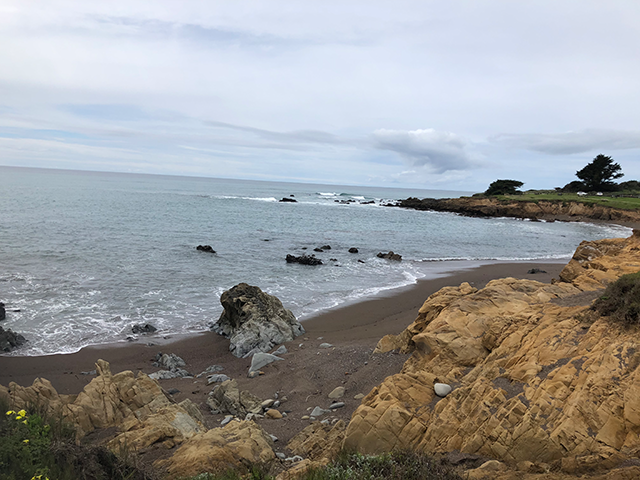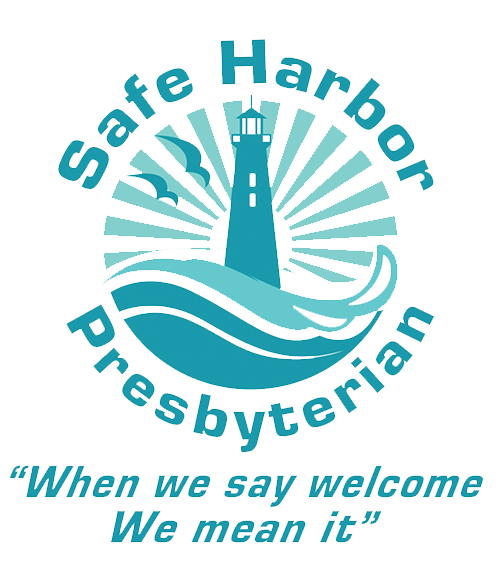
Daily Scripture and Prayer June 2020
Safe Harbor Presbyterian Church
This month we pray together with verses that highlight the opposition to Jesus teaching and how that grows. We meet Judas this month and the many others who turn away. At the same time many people are experiencing something extraordinary in Jesus. They are finding their hearts lighter, their minds clearer, their lives changed. They want to know more.
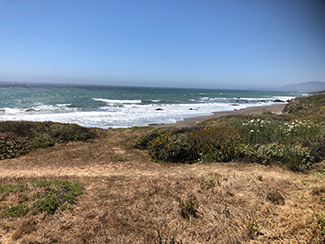 June 1 – John 6:48-51 – I am the bread of life. Your ancestors ate the manna in the wilderness, and they died. This is the bread that comes down from heaven, so that one may eat of it and not die. I am the living bread that came down from heaven. Whoever eats of this bread will live forever; and the bread that I will give for the life of the world is my flesh. [‘Flesh’ is not the same as body. The word refers to the complete person in all aspects. It is used in a variety of ways in the New Testament…and even in this unit. Here John is using the word in the broad and beautifully evocative way he did in chapter 1 “And the word became flesh and dwelt among us.” The construction of verse 51 makes clear the ‘give’ alludes to Jesus’ sacrifice and death for others. Again, the Passover theme is present. Jesus will be the Lamb. It is important to see, however, that the emphasis is not on death for sin, but, rather, death for life.]
June 1 – John 6:48-51 – I am the bread of life. Your ancestors ate the manna in the wilderness, and they died. This is the bread that comes down from heaven, so that one may eat of it and not die. I am the living bread that came down from heaven. Whoever eats of this bread will live forever; and the bread that I will give for the life of the world is my flesh. [‘Flesh’ is not the same as body. The word refers to the complete person in all aspects. It is used in a variety of ways in the New Testament…and even in this unit. Here John is using the word in the broad and beautifully evocative way he did in chapter 1 “And the word became flesh and dwelt among us.” The construction of verse 51 makes clear the ‘give’ alludes to Jesus’ sacrifice and death for others. Again, the Passover theme is present. Jesus will be the Lamb. It is important to see, however, that the emphasis is not on death for sin, but, rather, death for life.]
Dear God, how we hunger to take in more and more of your presence and teaching! Help us today not to rely solely on the physical things in our world, but to find ways to feed on all that you bring to our spirits so that we may brim with life itself. In Jesus’ holy name we pray. Amen.
June 2 – John 6:52-53 – The Jews disputed among themselves, saying, “How can this man give us his flesh to eat?” So Jesus said to them, “Very truly I tell you, unless you eat the flesh of the Son of Man and drink his blood, you have no life in you. [Jesus makes the connection in these verses that trusting him is tied to fulling spiritual hunger and being claimed by life itself. The word ‘disputed’ can mean either fought or debated. The ‘life’ he is talking about here is the principle of life itself, powerful, welling up inner aliveness. Eating flesh and drinking blood is a powerful symbolic way of talking about integration or assimilation of the essence of what is eaten and drunk into the one consuming, such that it sustains and transforms the consumer.]
Dear God, fighting and disputing always blind us to what you are trying to do in us and through us, doesn’t it? It leaves us unable to integrate your truth into our lives and we are stuck and hungry. Help us, God, to sort out the fights worth fighting and leave the rest to you. In Jesus’ holy name we pray. Amen.
June 3 – John 6:54-55 – Those who eat my flesh and drink my blood have eternal life, and I will raise them up on the last day; for my flesh is true food and my blood is true drink. [The word ‘eat’ is the word in Greek for an animal gnawing on a bone. The point is that we gnaw on the reality of Jesus until we have gotten every bit of goodness and nourishment from it. ‘My flesh is true food’ means something like ‘my flesh is really what flesh and blood should be.’ For us, the satisfaction finds its highest expression in the Lord’s Supper, but it is also found in Bible study, personal spiritual practice, and acts of justice and mercy.
Dear God, we want to feast on your presence and all that you have to teach and give us! Help us today to remember our true source and look for your everywhere. In Jesus’ holy name we pray. Amen.
June 4 – John 6:56 – Those who eat my flesh and drink my blood abide in me, and I in them. [Our spiritual practice results in mutual abiding. It is not a one way street. Jesus takes us into his heart as well when we take him into ours. This is similar to the concept that Paul uses in talking about community (koinonia), a mutual abiding so that together we live in Christ and Christ lives in us.]
Dear God, we are the community of your children, abiding together in and with your son. What a miracle of grace this is! Thank you that you never fail to bless our efforts to stay close to you and to one another. In Jesus’ holy name we pray. Amen.
June 5 – John 6:57-59 – Just as the living Father sent me, and I live because of the Father, so whoever eats me will live because of me. This is the bread that came down from heaven, not like that which your ancestors ate, and they died. But the one who eats this bread will live forever.” He said these things while he was teaching in the synagogue in Capernaum. [‘Living Father’ (zoe pater) emphasizes that God, who chose the name ‘I Am’, is the progenitor of all of the eternal life force that Jesus is bringing to us from the Father. When we take Jesus in, we take in the very life force of the Father. This life force that we consume in Jesus is eternal and makes us a part of the eternal realm as well. Remember, too, that living forever was not a well-developed or universally accepted idea in Judaism of Jesus’ day. Capernaum tended to be a friendly town so he is taking them deeper.]
Dear God, thank you for offering us to join with you in life everlasting. We are so grateful that your love, reaching out to us in Jesus, draws us into your presence. Help us today to live as those who know that we will never really die. How would you have that knowledge change us? In Jesus’ holy name we pray. Amen.
June 6 – John 6:60-61 – When many of his disciples heard it, they said, “This teaching is difficult; who can accept it?” But Jesus, being aware that his disciples were complaining about it, said to them, “Does this offend you?”[Jesus has a growing number of disciples. Remember that the disciples and the Twelve are not the same group. The disciples included all who were following him and trying to learn his ways. Even they are finding this teaching tough to take. The word ‘difficult’ (skleros) means intolerable or impossible. It is the root from which we get the word arteriosclerosis, hardening of the arteries. Using this word makes clear that it is hard for the teaching to get through to them. ‘Accept’ is the word for hearing and being changed by what one hears. ‘Offend’ is the word for causing someone to stumble.]
Dear God, sometimes we, too, find your teaching difficult to swallow. We read the scriptures too literally and we stumble. We, too, moan and complain about the demands of discipleship. We cannot eat and drink of you without being changed into embodied love as well, but we are so attached to our prejudices that we aren’t sure we want to give them up. Help us today to see the big picture of your eternal love. Help us not to grumble and stumble. In Jesus’ holy name we pray. Amen.
 June 7 – John 6:62-63 – Then what if you were to see the Son of Man ascending to where he was before? It is the spirit that gives life; the flesh is useless. The words that I have spoken to you are spirit and life. [The Greek word ‘flesh’ (sarx) has five distinct meanings in the New Testament. We don’t need to learn all of them now. Here, it refers to the part of human nature that is physical and has limitations, (as opposed to how it was used earlier to describe the totality of the human condition.) ‘Spirit’ here is not referring to the Holy Spirit as we usually think of it. In John all spirit is a manifestation of the creative and all pervasive Spirit of God. This word is often used to talk about a consciousness that is permeated by the Spirit of God but is at the same time still human in the fullest sense. It is that God imbued consciousness that brings inner aliveness and eternal life.]
June 7 – John 6:62-63 – Then what if you were to see the Son of Man ascending to where he was before? It is the spirit that gives life; the flesh is useless. The words that I have spoken to you are spirit and life. [The Greek word ‘flesh’ (sarx) has five distinct meanings in the New Testament. We don’t need to learn all of them now. Here, it refers to the part of human nature that is physical and has limitations, (as opposed to how it was used earlier to describe the totality of the human condition.) ‘Spirit’ here is not referring to the Holy Spirit as we usually think of it. In John all spirit is a manifestation of the creative and all pervasive Spirit of God. This word is often used to talk about a consciousness that is permeated by the Spirit of God but is at the same time still human in the fullest sense. It is that God imbued consciousness that brings inner aliveness and eternal life.]
Dear God, today help us to live fully conscious of your wild loving Spirit giving life to our own spirits. Help us not to rely on that which cannot sustain us, but rather to move with your Divine leading as the wind ruffles the leaves. In Jesus’ holy name we pray. Amen.
June 8 – John 6:64-66 – “But among you there are some who do not believe.” For Jesus knew from the first the ones that did not believe, and who was the one that would betray him. And he said, “For this reason I have told you that no one can come to me unless it is granted by the Father.” Because of this many of his disciples turned back, and no longer went about with him.
[The people were all over Jesus when he was providing free food, but when his words called them to change their behavior or attitudes, they wanted no part of it. In the evangelist John’s community, these were verses of comfort. They reminded them that the outreach of their movement was not solely up to them. It is believers’ job to proclaim. It is God’s job to draw people to faith.]
Dear God, help us not to wander into disbelief and the lack of trust just because we do not understand everything you say and do. We thank you that you are always at work drawing your children to yourself, and that even includes us. In Jesus’ holy name we pray. Amen.
June 9 – John 6:67 – So Jesus asked the twelve, “Do you also wish to go away?” [The ‘you’ here is plural. How poignant! Jesus looks at those closest to him and asks if they want to leave him too.]
Dear God, today when you look into our hearts, see only our love and commitment. Quiet in us any voice but your own, so that we may never stray far from you or abandon you when you need us most. In Jesus’ holy name we pray. Amen.
June 10 – John 6:68-69 – Simon Peter answered him, “Lord, to whom can we go? You have the words of eternal life. We have come to believe and know that you are the Holy One of God.” [These verses are John’s equivalent to Peter’s confession in Matthew 16. Referring to Jesus as ‘the Holy One of God’ has at least two nuances of meaning. First, it tells us that Jesus is a numinous reality, an awe inspiring being. Second, the word ‘hagios’ (holy) rarely occurs in classical Greek but is all over the New Testament. It literally means ‘to separate.’ So a holy one is one who is set apart from the collective consciousness of cultural group think. This one has an individual sense of morality and relates to others individually and not only as a group. The tense is the object genitive which reminds us that one noun derives its source from the other. So the source of holiness is God and the expression of it is Jesus. Notice that Peter gives three reasons for staying with Jesus. 1. They have no place else to go to find what they are looking for. 2. Jesus brings life. 3. Their faith has grown from early enthusiasm to deeper trust. That trust has led to deeper knowledge, as it always does.]
Dear God, We thank you for sending your Holy One to us to see us as individuals and relate to us personally. Help us today to trust and know. Remind us that there is no place else to go to assuage the deep hungers of our hearts. Thank you! In Jesus’ holy name we pray. Amen.
June 11 – John 6:70-71 – Jesus answered them, “Did I not choose you, the twelve? Yet one of you is a devil. He was speaking of Judas son of Simon Iscariot, for he, though one of the twelve, was going to betray him. [These verses introduce Judas for the first time. The word ‘devil’ means an accuser or slanderer. The word (diabolos) is ordinarily used of Satan. When we see the word ‘devil’ applied to people it is usually (daimon) demon. However, here it is diabolos. Perhaps this was John’s way of saying that Judas acted for and as the Devil. Timothy uses the word to apply to slanderers and false accusers several times. Perhaps that is all that is intended here.]
Dear God, we know how to slander and make false accusations, too. And we have painfully learned the consequences. Help us to avoid this trap, to speak honestly from love toward you and all your children. In Jesus’ holy name we pray. Amen.
[The context of the following verses is the Feast of Tabernacles or Booths. Tabernacles, a fall festival, was one of the most popular annual feasts in Jerusalem. Pilgrims came. People camped out in homemade leafy shelters on rooftops or in fields. The feast lasted seven days and gave thanks for the harvest (wine, fruit, olives) and remembered God’s miracles of provision in the wilderness. It also anticipated the longed for Second Exodus when God’s kingdom rule would be fully established on earth and Israel would be restored and freed once more. There were many wonderful ceremonies during this feast. The most important for our purposes was the daily ceremonial drawing of water from the pool of Siloam and the nightly lighting of the enormous candelabra in the Court of the Women. It was a time for focusing on the gifts of God, past, present and future.]
June 12 – John 7:1-2 – After this Jesus went about in Galilee. He did not wish to go about in Judea because the Jews were looking for an opportunity to kill him. Now the Jewish festival of Booths was near. [The current that flows under all of chapter seven is crisis and opposition.]
Dear God, we sometimes serve the same function in our world as the Jews in this passage. We are the establishment. We think our ways are your ways. Mercifully sometimes they are, but maybe not always. Are there places where we have made you unwelcome? Are there places when you come to us in unexpected packages and we turn you away at the door? Are there places in our own hearts that we have marked ‘Stay Out’? If that is so, Lord, help us to see it clearly and move with us to mend our hearts, church, and community. In Jesus’ holy name we pray. Amen.
June 13 – John 7:3-5 – So his brothers said to him, “Leave here and go to Judea so that your disciples also may see the works you are doing; for no one who want to be widely known acts in secret. If you do these things, show yourself to the world. (For not even his brothers believed him.) [These verses are written in the imperative and are a bit of a taunt. Scholars are unsure exactly who is meant by ‘brothers.’ Most believe it was probably those closest to Jesus and not his literal brothers. They are impatient with his living in obscurity in Galilee and are ready for him to storm the world. They also hope to win back some of the followers who have left the movement.]
Dear God, how impatient we sometimes are, and how distrusting of your timing. We often want you to do something dramatic that will show the world who you are again. We want to go back in time and reclaim the ones who have left your church or turned away from your truth. Help us, O God, to resist trying to tell you how and when to do your job. Help us to help you and not to hinder your work in our community and in the world. In Jesus’ holy name we pray. Amen.
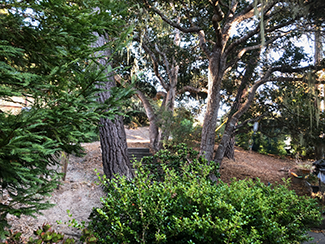 June 14 – John 7:6 – Jesus said to them, “My time has not yet come, but your time is always here. [A very important word in the Christian vocabulary is introduced here – ‘Kairos’. In Greek there are two words for ‘time.’ The first is ‘chronos’, from which we get the word chronology. It means linear time. ‘Kairos’ refers to divine time, opportune time, full time, time for decisive action. ‘Kairos’ is always a gift from God and determined by God. In this verse Jesus is saying that he has not yet heard from God about his movement into the fulfilment of his mission. He is also saying to them that now is the ‘Kairos’ time for them. Now is the time for them to understand and act on the higher things that God is revealing in Jesus.]
June 14 – John 7:6 – Jesus said to them, “My time has not yet come, but your time is always here. [A very important word in the Christian vocabulary is introduced here – ‘Kairos’. In Greek there are two words for ‘time.’ The first is ‘chronos’, from which we get the word chronology. It means linear time. ‘Kairos’ refers to divine time, opportune time, full time, time for decisive action. ‘Kairos’ is always a gift from God and determined by God. In this verse Jesus is saying that he has not yet heard from God about his movement into the fulfilment of his mission. He is also saying to them that now is the ‘Kairos’ time for them. Now is the time for them to understand and act on the higher things that God is revealing in Jesus.]
Dear God, we do not know your timing but we do know that this moment is our moment. Today is the day for us to grasp the realities of your kingdom and do our part in furthering it. Help us today not to look away from the work you have for us to do. Help us not to ignore the small tasks of love and witness that you use to build upon. If we are tired or confused, give us strength and clarity to seize this day. Thank you. In Jesus’ holy name we pray. Amen.
June 15 – John 7:7 – The world cannot hate you, but it hates me because I testify against it that its works are evil. [Another important word is introduced here – ‘kosmos’. We translate it as ‘world.’ It refers to the visible, material world that often functions in opposition to the values and rule of the kingdom of God. Jesus is saying that the world cannot hate them because they are still of it. The world does not hate its own. It does hate him because he sees it for what it is. He uses the word ‘paneros’ (evil) to describe the world. ‘Paneros’ refers to a malignant spiritual principle. The ancients often connected ‘paneros’ with egocentricity, or a state of unconsciousness. To remain in, or to linger over, or to toy with ‘kosmos paneros’, or ruling egocentricity, was to invite a cancer into the soul. The word ‘works’ can be translated, ‘ways.’]
Dear God, you see us so clearly and that is both comfort and conviction. We are often caught up in the externals of our lives, our small ego hurts, our self-centered goals, our perceived slights, the ways of the world. Help us today to break free of all the pettiness that binds us. Show us the glory of your way and strengthen us to walk in it. In Jesus’ holy name we pray. Amen.
June 16 – John 7:8-9 – Go to the festival yourselves. I am not going to this festival for my time has not yet fully come. After saying this, he remained in Galilee. [‘Not yet fully come’ (pleroo) refers to the accomplishment or fulfillment of a divine plan. Jesus has not yet received word from God about his next move and will not be pressured into premature action by human advice.]
Dear God, as your body, the church, we often feel pressured by the demands and preferences of others. One generation wants us to be one thing and another another. One person or family member wants one thing another another. Help us today to listen intently to you. Protect us from untimely choices made from either desperation or habit. Help us to stand with courage and assurance on your word of love and wait with expectation for our instructions. In Jesus’ holy name we pray. Amen.
June 17 – John 7:10 – But after his brothers had gone to the festival, then he also went, not publicly but as it were in secret. [This is a bit odd after all that for him to go anyway. Did God speak? Most scholars suggest that it was not the festival itself that he wanted to avoid, rather it was the pomp and swagger of his eager disciples. The word choice used here is for quietly, without ostentation and alone.]
Dear God, in our religious environment, with giant auditoriums, sound and light shows, televised worship and audiences in the millions, what is the role of our little band of believers? You saw value in the quiet and humble. It is in the quiet, like the womb, that things come to their fullness. Help us not to measure ourselves by the standards of those who seem so wildly successful. Help us to measure ourselves by the gentleness of your walk. There are times for the crowds and there are times for the quiet. Help us to release ourselves into your timing for us. In Jesus’ holy name we pray. Amen.
June 18 – John 7:11-13 – The Jews were looking for him at the festival and saying, “Where is he?” And there was considerable complaining about him among the crowds. While some were saying, “He is a good man,” others were saying, “No, he is deceiving the crowd.” Yet no one would speak openly about him for fear of the Jews. [Remember that when John uses ‘the Jews’ he is usually referring to the Sanhedrin and the leadership of the different parties. The atmosphere in Jerusalem is intense. Underneath the usual excitement and joy, there is a restlessness. The authorities are keeping an eye out for Jesus and looking for an opportunity to have him tried and executed. The crowds are disturbed by the vibrations of his teaching that are quaking through the whole area. There is a lot of complaining. This word means restless muttering or undercover talk. This marks a real division or krisis in the narrative. People are beginning to take sides. The accusation that he is deceiving the crowd was a capital offense.]
Dear God, sometimes today it feels like even those within the Christian family cannot agree on who you are and what you value. Your call to radical love and wholeness can terrify us if we don’t really want to change, or to give up our points of view. Help us today to not be paralyzed by divisions around us, or even within us. Give us a discerning spirit so that we may see you clearly, love you dearly, and follow you nearly. In Jesus’ holy name we pray. Amen.
June 19 – John 7:14-15 – About the middle of the festival Jesus went up into the temple and began to teach. The Jews were astonished at it, saying, “How does this man have such learning, when he has never been taught?” [This verse reveals the extreme prejudice of the religious elite. They are astounded that an unlettered peasant from Galilee could teach with such insight and authority. They believed that only those who had completed careful rabbinical education could do that. Teaching was passed on from one holy man to the next.]
Dear God, what are our prejudices? Upon whom do we cast a jaundiced eye? Are there people in our lives or community that we secretly think won’t amount to much so we write them off and fail to hear their innate wisdom? Help us today to be open to being surprised by what you are doing in and with those we rarely notice. In Jesus’ holy name we pray. Amen.
June 20 – John 7:16-18 – Then Jesus answered them, “My teaching is not mine but his who sent me. Anyone who resolves to do the will of God will know whether the teaching is from God or whether I am speaking on my own.” [Well, if the opposition was bad before, these verses make it worse. Jesus basically says that his teaching does not come from an authorized rabbinical source but directly from God. He then defends the claim by saying that if anyone is truly attuned to God, that one will recognize the truth he is teaching. This was a very confrontive argument. He is saying, “If you don’t believe me, you don’t know God.”]
Dear God, Yikes! Jesus is so very brave in the face of opposition. He doesn’t mince words or try to protect the feelings of his detractors. He just lays it out there and lets the chips fall where they may. O Lord, today help us to be brave and discerning in declaring the truth of your love, but please, don’t ask us to poke our fingers in someone else’s eye! In Jesus’ holy name we pray. Amen.
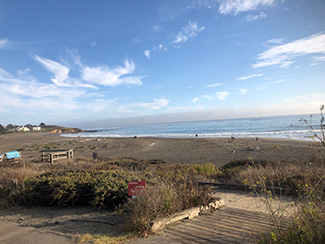 June 21 – John 7:19 – “Did not Moses give you the law? Yet none of your keeps the law. Why are you looking for an opportunity to kill me?”[Jesus has said that he is devoted solely to the will of the Father but his detractors accuse him of breaking the Law. They are referring to his healing of the man at the pool on a Sabbath. He answers them by saying they don’t keep the law either so what is their justification for trying to execute him?]
June 21 – John 7:19 – “Did not Moses give you the law? Yet none of your keeps the law. Why are you looking for an opportunity to kill me?”[Jesus has said that he is devoted solely to the will of the Father but his detractors accuse him of breaking the Law. They are referring to his healing of the man at the pool on a Sabbath. He answers them by saying they don’t keep the law either so what is their justification for trying to execute him?]
Dear God, it is so easy for us to see the faults of others and to dismiss our own. In truth, it is our own failings that we see in others that drive us craziest. Today, help us to see ourselves clearly before we speak a word of judgment. If we see flaws, we ask that you mend them. If we see love, we ask that you magnify it. In Jesus’ holy name we pray. Amen.
June 22 – John 7:20 – The crowd answered, “You have a demon! Who is trying to kill you?” [Apparently the crowds do not know of the leaders intent or else they don’t want to be associated with it. The concept of ‘demon’ is multifaceted. The word used means ‘demented, or to have a crazy-insane imagination.’ It might be translated into modern usage as ‘paranoid.’]
Dear God, we confess that sometimes we, too, think that the things you do or say are a bit crazy. Love your enemies? Give to anyone who asks of you? Blessed are the poor, peacemakers, humble? Rise and walk? Declare justice? In our world that is crazy talk. But in your realm, in your amazing world-upside-down kingdom, it is just the way it is. Help us, dear Lord, to see through the haze of worldly values to the heart of the heart of you so that we may be your very presence in our families, church, and community. In Jesus’ holy name we pray. Amen.
June 23 – John 7:21-23 – Jesus answered them,” I performed one work, and all of you are astonished. Moses gave you circumcision (it is, of course, not from Moses but from the patriarchs), and you circumcise a man on the sabbath. If a man receives circumcision on the sabbath in order that the law of Moses may not be broken, are you angry with me because I healed a man’s whole body on the sabbath?” [Jesus admits to performing a work on Sabbath but points out the hypocrisy of their horror at it. The rabbis taught that if the eighth day of a child’s life fell on the sabbath, that the call of circumcision overrode the sabbath restrictions. The reason they gave was that circumcision was a unique way of pointing to the redemptive purpose of God and that that was a higher calling. Jesus says that his action of healing the whole man was a fulfillment of sabbath law by not just pointing to, but manifesting God’s redeeming purpose. The word ‘astonished’ is also translated ‘ horrified, marveled, or scandalized.’]
Dear God, help us today not to be so rule and custom bound that we cannot see and celebrate the higher good that you are always working for all of us. In Jesus’ holy name we pray. Amen.
June 24 – John 7:24 – “Do not judge by appearances, but judge with right judgement. [The words for judge and judgment here are forms of ‘krisis’, to divide or separate. Jesus calls on them not to make surface judgments or divisions about what is happening around them based on a shallow understanding of scripture and of God’s will. They are to make their judgments on a deeper level, only out of their deep living relationship with God. It is that and that alone that leads to right judgment.]
Dear God, help us today to deepen our relationship with you. Raise to our minds throughout the day your kingdom’s values for us to ponder. Preserve us from shallow judgments and give us open loving hearts. In Jesus’ holy name we pray. Amen.
June 25 – John 7:25-27 – Now some of the people of Jerusalem were saying, “Is not this the man whom they are trying to kill? And here he is speaking openly, but they say nothing to him! Can it be that the authorities really know that this is the Messiah? Yet we know where this man is from; but when the Messiah comes, no one will know where he is from.” [There were many expectations of where and how Messiah would come. Some believed that he would be a ‘Hidden Messiah.’ Nobody would know where he came from or see him arise until the deceive moment when he gathered an army and redeemed Israel. This was a way of affirming that God was up to their healing even when they couldn’t see it. Jesus confuses this expectation because they know, or think they know, his origins. The crowd is beginning to wonder if the authorities know something they don’t and are keeping it from them. Be aware that the characters in the story and John the author are thinking on two different levels. The crowd is thinking literally. John sees Jesus as almost always speaking spiritually or symbolically. John’s gospel portrays people who are caught up in literal thinking as spiritually ignorant.]
Dear God, we always think that someone has greater understanding than we do. Sometimes we use that as an excuse to stay on the surface. Sometimes it is a goad to go deeper. Help us today not to allow shallow expectations of you and how you come into our lives to blind us to the many ways you actually do come. Open the eyes of our hearts, Lord! We want to see you! In Jesus’ holy name we pray. Amen.
June 26 – John 7:28-30 – Then Jesus cried out as he was teaching in the temple, “You know me, and you know where I am from. I have not come on my own. But the one who sent me is true, and you do not know him. I know him, because I am from him, and he sent me.” Then they tried to arrest him, but no one laid hands on him, because his hour had not yet come. [There are several words for ‘know’ in Greek. Jesus uses forms of the word ‘oida’ in this text. It often means fullness of knowledge or perception. Sometimes it is translated as perceive. The interesting thing about this word, as opposed to others, is that it does not indicate a relationships between the knower and the known. That is interesting to ponder especially since in many instances when Jesus talks about his relationship with the Father he uses ‘ginosko’ which implies full knowledge born of an intimate relationship. Here is he just talking about what people are able to perceive, not what they know from depth relationship. Notice here, too, that people are supernaturally prevented from laying hands on him. God will not permit God’s timing to be tampered with.]
Dear God, sometimes we ‘see’ you but do not ‘know’ you deeply. Yet there are glimpses of your divine presence and purpose around us and among us and within us every day. Help us today to see you from the place of deep intimacy so that we can walk with clarity through our hours. In Jesus’ holy name we pray. Amen.
June 27 – John 7:31 – Yet many in the crowd believed in him and were saying, “When the Messiah comes, will he do more signs than this man has done?” [The people have become entranced by the signs Jesus has done. There is no expectation in the Old Testament that Messiah will be a miracle worker per se. He is to be a liberating political/military hero. Still, they are so amazed, and so hungry for wholeness, that they can’t imagine anyone being able to do more for them than what they are seeing in Jesus. Many are deciding to trust him.]
Dear God, it can be so easy to trust you when we see the flashy miracles. It takes more faith to trust when we do not see them and you seem to tarry too long in answering our prayers. Plant in us today a new measure of trust, so that whatever comes our way, we can face it, confident in your redeeming love. In Jesus’ holy name we pray. Amen.
 June 28 – John 7:32-34 – The Pharisees hear the crowd muttering such things about him, and the chief priests and Pharisees sent temple police to arrest him. Jesus said to them, “I will be with you a little while longer, then I am going to him who sent me. You will search for me and you will not find me; and where I am, you cannot come.” [The temple police were employees of the Sanhedrin. The word for ‘mutter’ indicates a kind of growling, discontented undertone. It is that undertone that frightens the authorities and leads them to act. Again, Jesus is talking on a spiritual level and they are hearing on a literal one. They want to stop trouble. He wants to save them. Jesus recognizes that until they are lifted from their locked thinking they will search but never find.]
June 28 – John 7:32-34 – The Pharisees hear the crowd muttering such things about him, and the chief priests and Pharisees sent temple police to arrest him. Jesus said to them, “I will be with you a little while longer, then I am going to him who sent me. You will search for me and you will not find me; and where I am, you cannot come.” [The temple police were employees of the Sanhedrin. The word for ‘mutter’ indicates a kind of growling, discontented undertone. It is that undertone that frightens the authorities and leads them to act. Again, Jesus is talking on a spiritual level and they are hearing on a literal one. They want to stop trouble. He wants to save them. Jesus recognizes that until they are lifted from their locked thinking they will search but never find.]
Dear God, sometimes we panic when the muttering and discontent reaches our ears. We take precipitous actions with far ranging and unseen consequences. Help us today to rise above the clatter around us, even inside us. Help us to focus on you and not be led astray by trying to satisfy the needs of those who cannot be satisfied. In Jesus’ holy name we pray. Amen.
June 29 – John 7:35 – The Jews said to one another, “Where does this man intend to go that we will not find him? Does he intend to go to the Dispersion among the Greeks and teach the Greeks?” [The Dispersion refers to the Jews who were living outside of Palestine. The idea that Jesus would be going to them and then teaching the Greeks was totally absurd to them. Not only are they locked in their literal thinking, they are also locked into their ethnic prejudices.]
Dear God, sometimes it is hard for the powerful to see beyond their noses, hard to imagine that any doors are closed to them, or any insight exists beyond their own. Protect us, O God, in our privilege, from falling victim to our prejudices. Open our eyes, expand our hearts and humble our arrogance. Do not let us think that any who long for wholeness are unworthy of your word. Do not allow us to see your call on our own lives as too far-fetched or absurd. In Jesus’ holy name we pray. Amen.
June 30 – John 7:36 – “What does he mean by saying, ‘You will search for me and you will not find me’ and ‘Where I am, you cannot come’?” [The image of searching but not finding has a history in the Old Testament. In Proverbs 1:28f, we read, ‘They may look for me but they shall not find me because they hated knowledge and have not revered the Lord.’ Surely this text would have been in Jesus’ mind when he spoke and in the leaders minds as they heard. They are worried that he is saying to them that they hate true knowledge of God, prefer their power and positions, and have come to revere their positions more than the Lord. No wonder they are upset!]
Dear God, is there anything in our hearts that we really revere more than you? Do we worship our positions, our traditions, our comfort zones, our ideologies? Do we allow those things, many of which are good gifts from you, to blind us to new things to which you may call us? Do we prefer comfort to healing, power to grace, tradition to innovation? Give us today, Lord, the gift of discernment so that we can see what is good, ultimate and needs protecting and lay aside anything that keeps us from you and your will for us. In Jesus’ holy name we pray. Amen.



